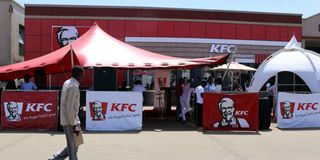Is KFC mashing Kenyan farmers?

A Kentucky Fried Chicken (KFC) outlet in Kisumu City.
What you need to know:
- Multinationals across the globe, particularly in the food and related sectors, adhere to stringent quality standards.
- Perhaps KFC Kenya is baking in a potato shortage debacle because it goes against the grain (potato?).
The local franchise of American fast food restaurant chain Kentucky Fried Chicken (KFC) hardly predicted the online roasting that ensued earlier this week following their potato shortage tweet.
Kenyans rallied to drop KFC’s products like a hot potato with the Twitter hashtag #BoycottKFC taking the slot of the top trending topic for most of two days. Although KFC’s Chief Executive for East Africa Jacques Theunissen explained that the firm cannot buy local potatoes due to its strict global quality assurance and food safety standards, questions abound.
In its August 2021 report, “Potato Production in Kenya: A Guide to Good Agronomic and Plant Nutrition Practices”, the African Plant Nutrition Institute (APNI) said Kenyan farmers grow potato on 150,000 hectares, producing two million tonnes annually worth Sh50 billion with a direct benefit to 800,000 Kenyans. Yet KFC has less than 35 outlets in the country.
KFC’s argument about quality assurance and food safety standards seems valid, however. Multinationals across the globe, particularly in the food and related sectors, adhere to stringent quality standards for reasons ranging from consistency to cost and health standards.
British American Tobacco (BAT), for example, strives to retain a consistent flavour of its cigarette brands across the world. A Dunhill cigarette from its Nairobi production hub should have the same flavour as that from any other of its manufacturing hubs across the world, regardless of the country were the tobacco leaf that was used in manufacturing was sourced or who the farmers were or their citizenship.
To ensure the integrity and quality of its products, the company contracts “valued business partners” ,who are tobacco farmers, and provides farm inputs, loans, training and a ready market for their crop.
Potato shortage debacle
Other multinationals, such as Coca-Cola, Nestlé and Kenya Breweries, have similar “shared value” programmes with mango, milk and sorghum farmers, respectively.
Domestic, Kenyan companies have also followed suit. Githunguri Dairy Farmers Co-operative Society is one among a host of dairy, coffee and farmers co-operative societies that provide their membership with inputs, training and loans to facilitate quality production to sustain working partnerships with global partners such as the supply of milk to Carrefour.
Perhaps KFC Kenya is baking in a potato shortage debacle because it goes against the grain (potato?). Perhaps the Trade and Agriculture ministries ought to engage KFC for a roadmap on how select Kenyan potato farmers can be supported to farm produce that matches its standards. That would have milestones and embedded policy rewards such as tax incentives on locally sourced potatoes and punishments like punitive tariff, non-tariff and other barriers on imports.
However, as Kenyans push the #BoycottKFC hashtag, let them know that there are limits to the extent to which the government can enact trade policies to discourage potato imports from African countries, considering international treaties and new developments such as the African Continental Free Trade Area (AfCFTA) that seek to promote intra-African trade.
AfCFTA provides a market of 1.3 billion people with a combined gross domestic product (GDP) of $3.4 trillion that Kenya can exploit through cooperation as opposed to adverse competition with African countries like Egypt and South Africa that supply potatoes to Kenya.
Foreign investment
Kenyans should also reflect that foreign direct investment by multinationals such as KFC brings a bundle of benefits besides those that accrue to raw materials suppliers such as farmers.
We should, therefore, endeavour to create an investor-friendly environment to avoid scaring away investors at a time when global geographical capital mobility, leading to capital flight, is super easy in an information and interconnected age where most governments are pursuing the so-called “race to the bottom” expansionist policies by reducing taxes and giving attractive incentives to foreign investment.
Additionally, many multinationals, for example, Starbucks, have been eying Kenya and might be monitoring the progress of first entrants such as KFC; #BoycottKFC is hardly what would encourage them.
Therefore, inasmuch as it is particularly important to engage KFC and other multinationals on the importance of creating “shared value” goals with their Kenyan stakeholders such as farmers, we must not lose sight of the total basket of benefits that foreign investments accrue to our country, such as knowledge and technology transfer, taxes and, also important, employment creation, among other benefits.
Proportionately, multinationals such as KFC must avoid stumbling over the peel over technicalities such as this potato acrimony where they could have their cake and eat it by fostering successful, mutually beneficial “shared value” partnerships with stakeholders such as farmers to achieve their stringent quality standards and build trust and a loyal customer base.
Mr Miriti is an international tax scholar. [email protected]





